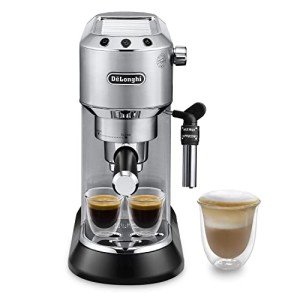Best Espresso Machines: A Comprehensive Guide
Espresso machines have actually become a staple in coffee culture, attracting lovers and casual drinkers alike. The perfect shot of espresso can elevate the coffee experience, and picking the ideal machine is vital for accomplishing this objective. This article explores the world of espresso machines, exploring some of the very best options available on the market today. It will cover the kinds of machines, key functions to consider, a contrast table, and regularly asked concerns.
Types of Espresso Machines
Before venturing into specific items, it's vital to comprehend the various kinds of espresso machines available:
- Manual Machines: Also called lever machines, these need the user to manually manage the pressure and circulation of water. They offer a hands-on experience but need more skill.
- Semi-Automatic Machines: These machines automate the pressure and temperature, while enabling users to control the shot timing. They are ideal for those who desire to take control without requiring excessive effort.
- Automatic Machines: These gadgets automate the brewing procedure totally; users merely select the size and strength of the shot. Great for beginners.
- Super-Automatic Machines: This type grinds the beans, tamps, brews, and even froths milk automatically. They're excellent for benefit, making them appropriate for those who desire speed without compromising quality.
- Capsule Machines: Utilizing pre-packaged coffee pods, these are the most basic machines for making espresso. While convenient, they often lack the depth of flavor found in freshly ground beans.
Secret Features to Consider
When searching for the very best espresso machine, a number of important features should direct your choice:
- Pressure: The ideal pressure for an espresso machine is 9 bars. This pressure is vital for drawing out tastes efficiently.
- Temperature level Control: Consistent water temperature is essential for an excellent espresso. Search for machines with PID (Proportional Integral Derivative) temperature control.
- Develop Quality: Machines made from high-quality materials tend to last longer and offer a much better experience.
- Size and Footprint: Consider your readily available counter space. Stainless Steel Espresso Machines are compact, while others require significant area.
- Grinder Quality: A built-in grinder provides convenience, but the quality of the grinder impacts the last taste. Doser or doserless types change the flavor profile significantly.
- Reduce of Use and Cleaning: Consider how easy the machine is to tidy and maintain. Machines with removable parts usually provide simpler cleaning.
Comparison Table of Best Espresso Machines
Here's a contrast table showcasing some of the most recommended espresso machines based on different user reviews and expert scores:
| Espresso Machine | Type | Pressure (Bars) | PID Control | Grinder Type | Cost Range |
|---|---|---|---|---|---|
| Breville Barista Express | Semi-Automatic | 9 | Yes | Cone-shaped burr grinder | ₤ 600 - ₤ 700 |
| De'Longhi EC155 | Manual | 15 | No | No grinder | ₤ 100 - ₤ 150 |
| Rancilio Silvia | Semi-Automatic | 9 | No | No grinder | ₤ 700 - ₤ 800 |
| Saeco Xelsis | Super-Automatic | 15 | Yes | Integrated grinder | ₤ 1,000 - ₤ 1,500 |
| Nespresso VertuoPlus | Capsule | N/A | No | No grinder | ₤ 150 - ₤ 200 |
| Gaggia Classic Pro | Semi-Automatic | 9 | Yes | No grinder | ₤ 400 - ₤ 500 |
Summary of Best Espresso Machines
- For Beginners: The De'Longhi EC155 is an outstanding beginning point due to its affordable price and ease of use.
- For Serious Enthusiasts: The Rancilio Silvia offers a balance between quality and control, appealing to those who wish to improve their barista abilities.
- For Convenience: The Saeco Xelsis stands apart as a top super-automatic alternative, best for users seeking optimum ease without jeopardizing taste.
Frequently Asked Questions (FAQs)
Q1: What is the very best pressure for drawing out espresso?A1: The ideal pressure is 9 bars; this pressure level is optimal for extracting the flavors in espresso.
Q2: How frequently should I clean my espresso machine?A2: Regular cleansing is essential. For machines with built-in mills, it is best to clean them after every use. Deep cleaning should be done weekly or month-to-month depending on use and model.
Q3: Can I use routine coffee in an espresso machine?A3: Espresso is made from finely ground coffee, ideally roasted specifically for espresso. While you can use routine coffee, the taste and extraction might differ.
Q4: How long can my espresso machine last?A4: With appropriate care and maintenance, a high-quality espresso machine can last numerous years, even years.
Q5: What grinder should I use for espresso?A5: A burr grinder is more effective, as it offers consistent grind size which is important for correct extraction.
The journey to finding the very best espresso machine can be an interesting one, filled with discovery and potential for developing one's coffee palate. Whether choosing for the simpleness of a pill machine or the control of a manual model, understanding the different types and features can significantly improve the experience. With advances in technology and development, there's an appropriate espresso machine for all preferences and skill levels on the market today. Purchasing Stainless Steel Espresso Machines assures fantastic flavor but likewise raises the total coffee experience.

